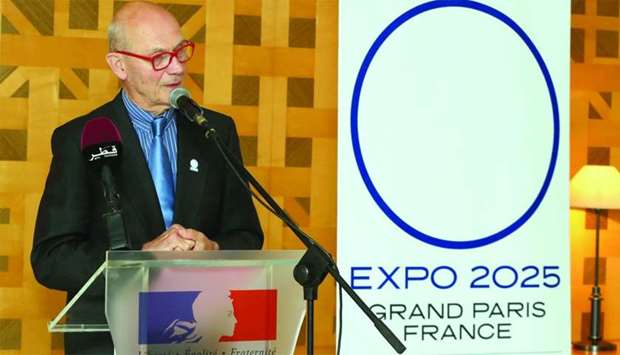

Qatari investments in France “have grown substantially,” according to a former official of the World Trade Organisation (WTO), who was in Qatar recently to promote the country’s bid to organise the World Exposition in 2025.
Former WTO director general Pascal Lamy, who is France’s delegate for the 2025 Expo bid, told Gulf Times that Qatari investments in France have increased in the technology, real estate, distribution, and sport sectors, among others.
Asked if the visit of Greater Paris Investment Agency (GPIA) president Pierre Simon in 2015, was instrumental in attracting more Qatari FDI to France, Lamy said, “I’ve looked at the numbers before coming here, if the pitch in 2015 was for Qatar to invest more in France, it has been successful.”
In 2015, Simon led a delegation to Qatar to promote the ‘Greater Paris Project’ where he encouraged Qatari investors to participate in a wide range of real estate opportunities.
Simon told Gulf Times that the project aims to accelerate economic development of Paris through large-scale real estate investment opportunities. It also aims to transform ‘The City of Light’ into a world-class metropolis and represents €130bn worth of public and private investment over 2012 to 2025 in office real estate, major public infrastructures, and innovative companies, among others.
Lamy said, “Qatari investments in France have grown whether it is because of this pitch or not, I don’t know. But the reality is just look at the numbers and they have grown quite substantially. And by the way, the same is also true the other way around, so it works.”
Responding to a query about the ongoing economic blockade imposed on Qatar, Lamy said globalisation has softened the impact of the Gulf crisis on Qatar.
“We’ve reached a stage of globalisation…so, what I see in the case of Qatar is that it is a trade focus, which hasn’t, so far, seriously affected the Qatari economy,” Lamy pointed out.
“And why is it so? Because in a global economy, in an economy where goods and services, and people circulate freely or much more freely in the past, if one route is closed, you choose another route. If one of your sourcing disappears, you choose another sourcing,” he said.
He added, “So, in many ways, globalisation is a protection against the damaging impact of trade measures of this kind…and this is the reason why I do not think that US President Donald Trump will put a 45% tariff on Chinese exports because it would probably damage the US economy more than the Chinese economy.
“I think it’s a feature of the modern economy that production systems, whether goods or services, are now interconnected in such as a way that they are more resilient, although there can be occasions where these interconnections lead to a contagion.”
Last updated: January 13 2018 09:44 PM
more recommended stories
 Fentanyl Seizures at Border Continue to Spike, Making San Diego a National Epicenter for Fentanyl Trafficking
Fentanyl Seizures at Border Continue to Spike, Making San Diego a National Epicenter for Fentanyl TraffickingFentanyl Seizures at Border Continue to.
 Utah Man Sentenced for Hate Crime Attack of Three Men
Utah Man Sentenced for Hate Crime Attack of Three MenTuesday, August 8, 2023 A.
 Green Energy Company Biden Hosted At White House Files For Bankruptcy
Green Energy Company Biden Hosted At White House Files For BankruptcyAug 7 (Reuters) – Electric-vehicle parts.
 Former ABC News Reporter Who “Debunked” Pizzagate Pleads Guilty of Possessing Child pδrn
Former ABC News Reporter Who “Debunked” Pizzagate Pleads Guilty of Possessing Child pδrnFriday, July 21, 2023 A former.
 Six Harvard Medical School and an Arkansas mortuary Charged With Trafficking In Stolen Human Remains
Six Harvard Medical School and an Arkansas mortuary Charged With Trafficking In Stolen Human RemainsSCRANTON – The United States.
 Over 300 People Facing Federal Charges For Crimes Committed During Nationwide Demonstrations
Over 300 People Facing Federal Charges For Crimes Committed During Nationwide DemonstrationsThe Department of Justice announced that.
